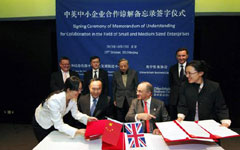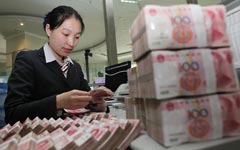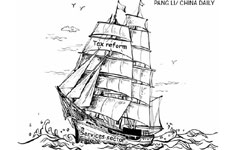The government will release a detailed list of administrative fees for micro-sized and small enterprises as it seeks to alleviate the financial burdens of a group of companies that are a source of economic dynamism, an official said on Tuesday.
These enterprises are subject to onerous, sometimes random administrative fees. These fees, along with various taxes, have imposed a heavy financial burden on approximately 11.7 million such companies that existed in China as of the end of 2013.

|
 |
 |
But many managers on the ground said they hardly felt the effect of these changes.
Liu Mengjue, a manager of Wenzhou Jingyi Garment Co Ltd, which employs fewer than 40 people, said the company faces many kinds of fees from different levels of government.
"The real burden is all kinds of taxes and fees coming from administrations at the county, district and village levels. The fees come one after another. We hope they will be eliminated or cut soon," he said.
The central government has also eased smaller companies' tax burdens. Starting last August, small companies (defined as those monthly revenue of less than 20,000 yuan) were exempted from value-added tax and business tax. And starting last month, companies with annual taxable revenue of less than 100,000 yuan have been able to have their corporate income tax halved. The threshold was previously 60,000 yuan.
About 85 percent of China's micro-sized and small enterprises are covered by the latest tax break, up from 26 percent, according to the State Administration of Taxation.
Still, the government acknowledges these tiny enterprises face a raft of problems-rising labor costs, difficulties borrowing from banks, high interest rates, a slowing economy and sluggish demand.
"I don't see any recent progress to make financing easier for small and micro-sized companies. Here in Wenzhou, it's possible to borrow from banks if a company offers its facilities as collateral. But if a company doesn't qualify for a bank loan and turns to underground lending, which used to thrive in Wenzhou, it is totally impossible nowadays," said Liu.
Another "unmentioned problem" for these companies, according to Zhen Xin, director of the ministry's SME department, is that powerful State-owned enterprises often delay payments to small companies, exacerbating their cash flow problems.
